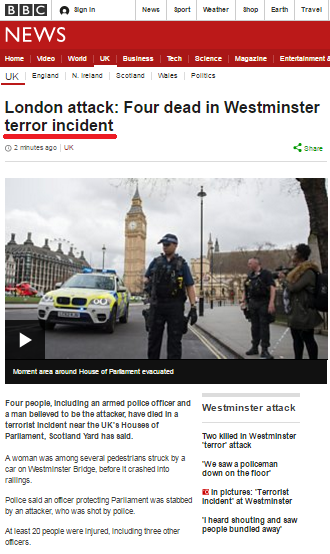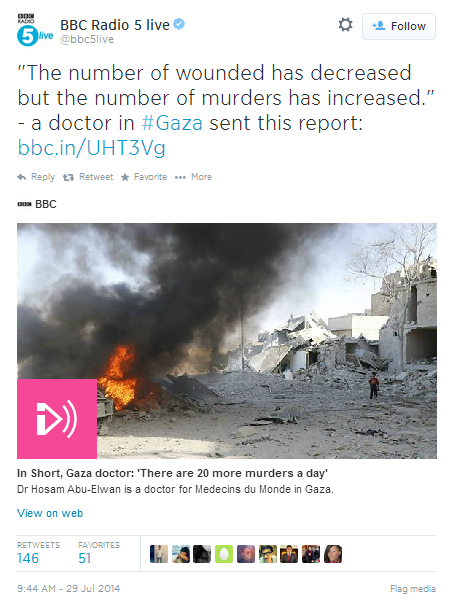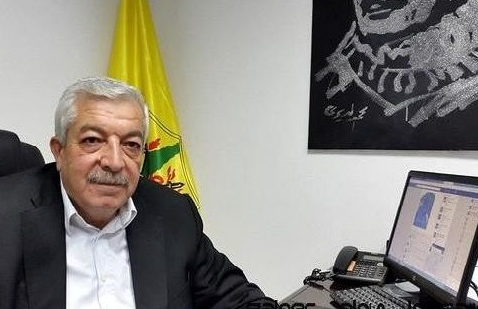Those who have been following the BBC’s coverage of the recent attack at a synagogue near San Diego may have noticed that the sole use of the word terrorist appears in a quote from the wounded Rabbi in one of the BBC’s reports. A programme aired last month casts some light on related editorial policy.
The March 22nd edition of the BBC Radio 4 programme ‘Feedback’ included an item (from 1:03 here) concerning criticism of the BBC’s coverage of the terror attacks at two mosques in Christchurch, New Zealand, the previous week. Presenter Roger Bolton spoke with the BBC News editorial director Kamal Ahmed and from 5:20 the conversation turned to “the use of the word terrorism”. [emphasis in italics in the original]
Bolton: “Should the BBC have used the term ‘terrorist attack’ instead of ‘shooting’?”
Ahmed: “On the issue of terror and terrorism our guidance is clear. There is no definition of what is a terrorist attack and who is a terrorist. If we use the word we want to attribute it and we attributed it correctly to the New Zealand prime minister…”
Bolton: “What our listeners come back and say, and quite forcibly, if this had been conducted by Islamists you would have called it terrorism. Because it was conducted by someone who is not, you’re more reluctant to apply the term terrorism.”
Ahmed: “We went through a long list of other headlines and how we had covered other atrocities like the London Bridge attack, like the Westminster attack, like the Manchester concert attack. Because terrorism and a terror attack carry a huge amount of different opinions about when we should use that term, we need to explain what happened first, as I say…”
Bolton: “You say that straightforwardly but for some reason – the audience largely I think does not understand this – you are reluctant to use the word terror. Clearly one of their aims is not just to kill people but to gain publicity and to create a sense of terror.”
Ahmed: “There is no agreed definition of what a terrorist is. It is disputed.”
Bolton: “So does that mean we will never use it independently?”
Ahmed: “No, there is no ban on any use of words in the BBC…”
Bolton: “So would you use the expression without attributing it to somebody?”
Ahmed: “We have very clear guidelines that the use of the word is surrounded by all sorts of complications and actually confuses the issue.”
Bolton: “So it’s something you are reluctant to use, that term. Does that mean your instruction to those who write scripts and so on is avoid using the word terrorism?”
Ahmed: “Not at all. Not at all.”
Bolton: “I still don’t understand when you think it would be suitable to use it other than when you’re attributing it to someone else.”
Ahmed: “I think, Roger, we’re trying to get down to a kind of precise definition which we’re not going to get to. We want to be consistent. One of your listeners said that it was because we were worried about inflaming the masses. That is not the issue. These are live discussions. These are delicate, complicated areas which we discuss with colleagues throughout. But we’re very clear: the most important point is that audiences understand what has happened.”
Roger Bolton is of course understandably confused by the BBC’s approach to the issue because despite Ahmed’s claim that the BBC wants “to be consistent”, it is anything but.
Just over a month before the New Zealand attacks the BBC News website had once again described the 2015 attacks against mainly British tourists in Tunisia as terror.
The 2017 Westminster Bridge incident mentioned by Ahmed was described from the outset by the BBC as terrorism and the term has been used in reports on the Manchester and London Bridge attacks.
Attacks in Barcelona, Stockholm, Nice, Berlin, Brussels and Paris have been reported using the term terrorism while attacks in Egypt – and of course Israel – have not.
Notably among the BBC reports tagged ‘Christchurch mosque shootings’ is an article headlined “Far-right terror poses ‘biggest threat’ to north of England”.
Kamal Ahmed is of course not the first senior BBC journalist to defend the corporation’s double standards on language when reporting terrorism but his claim that “there is no definition of what is a terrorist attack and who is a terrorist” is weakened by the fact that when it has wanted to, the BBC has found just such a definition.
Related Articles:
BBC Complaints: terror attacks in Jerusalem and Tunisia are “very different”
Radio 4 gives insight into BBC avoidance of the use of the term ‘terror’ in Israel
BBC News finds terror (without quotation marks) in Europe
BBC finds a ‘working definition’ for terrorism in Europe
BBC double standards on terrorism surface yet again
A new BBC ‘explanation’ for its double standards on terror




